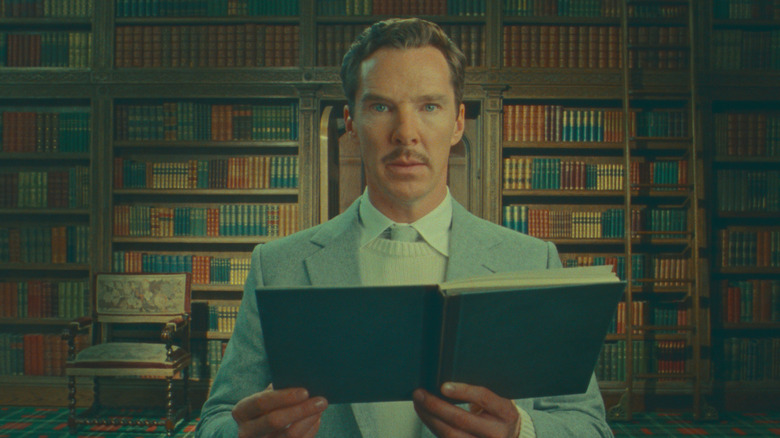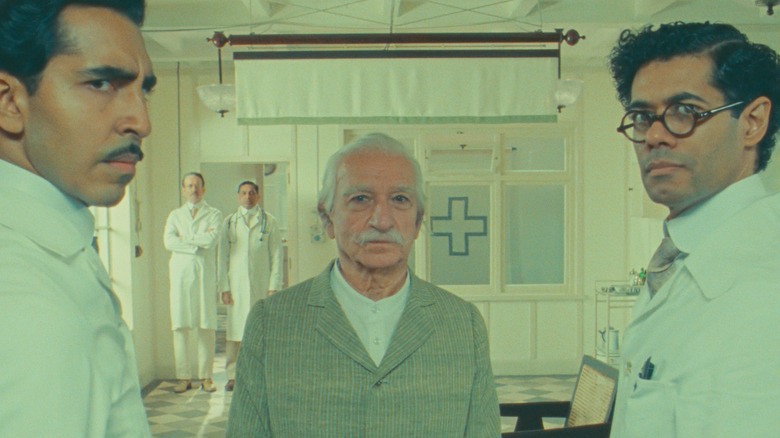The Wonderful Story Of Henry Sugar Review: Wes Anderson's Latest Roald Dahl Adaptation Is Wonderful Indeed
To hear Wes Anderson tell it, it was no easy feat to adapt Roald Dahl's "The Wonderful Story of Henry Sugar" to the screen. Then, inspiration hit. As Anderson says in the film's press notes: "I am equally interested in the way Dahl tells the story as I am in the story itself." With this in mind, Anderson's delightful short film "The Wonderful Story of Henry Sugar" is a nesting doll of a tale; a story about stories being told. Of course, Anderson has used this story-within-a-story-within-a-story approach several times already (his other 2023 film, the fantastic "Asteroid City" does this), so you have to wonder why it took him so long to crack the code.
No matter. Cracked it he has, and the results are a whirlwind of whimsy; a funny, dry, non-stop journey from one story to the next. To keep the storytelling aspect intact, Anderson even goes ahead and makes Dahl a character in the film, played by Ralph Fiennes, scribbling away in his cozy little writer's hut and narrating the story of Henry Sugar. Who is Henry Sugar? As played by Benedict Cumberbatch (who eventually takes over narrating duties from Fiennes/Dahl, only to have narrating duties taken away by another character, and another, and so on), he's a wealthy man who doesn't do much of anything, other than be wealthy. Then one day Henry spots a slim book in his friend's library.
The book was written by Dr. Z.Z. Chatterjee (Dev Patel), recounting the strange tale of Imdad Khan (Ben Kingsley), a man with the amazing ability to see without using his eyes. One particular part of the story piques Henry's interest: Khan can see the suit of a playing card just by looking at the back of the object. Henry theorizes that if he can master this same skill, he can cheat at gambling and make even more money.
A whirlwind of whimsy
This is all potentially very silly, and indeed, "The Wonderful Story of Henry Sugar" is frequently laugh-out-loud funny. But like most of Anderson's work, there's a certain type of melancholy underneath it all; a sadness you can't quite pin down. The film also makes you dizzy in how fast it proceeds — the multiple narrators speak directly to the camera in a breakneck, rapid-fire manner, never seeming to take a breath as they rattle off a story within a story within a story. You start to feel like you're running a marathon as you watch it all.
Anderson brings his usual beautiful, playful stylistic choices to the proceedings. Here, the entire film is set up to almost resemble a play, complete with sets that slide or descend into place, stagehands dragging props into frame, and spotlights hitting actors as they deliver certain monologues. Blending live-action and animation and a plethora of colors, "The Wonderful Story of Henry Sugar" looks distinct and gorgeous, and there's fun to be had in the way the characters will quickly switch costumes just off frame (almost everyone here pulls double-duty playing more than one character).
But all of this style wouldn't work as well as it does without the story, or stories, and that's where Anderson is clearly having the most fun. As the narrative unfolded in lickety-split fashion, I found myself totally charmed and a little dizzy. Anderson uses almost all of Dahl's prose here, and while that could've backfired, or even resulted in bloat, the filmmaker keeps the proceedings brisk and snappy, relying on Dahl's inherent dry humor to do a lot of the heavy lifting. And through it all that sense of sadness prevails; characters die just as we've gotten to know them, and their demise seems strangely tragic for such a peppy film. It's all a sign of the power of the writer's words. As Anderson says, it's about the telling of the story as much as it is about the story itself.
/Film Rating: 9 out of 10
"The Wonderful Story of Henry Sugar" is now streaming on Netflix.

